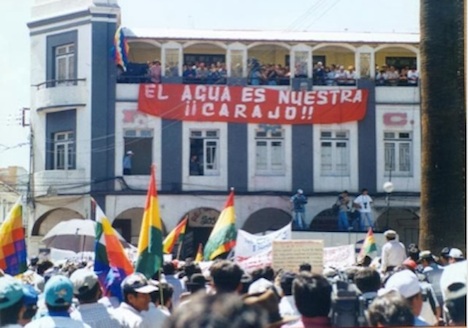| …Without Losing Foreign Investment Corporate sovereignty chapters in TAFTA/TTIP and TPP have emerged as some of the most controversial elements in those agreements. Meanwhile, countries that already have bilateral investment treaties (BITs) with investor-state dispute settlement (ISDS) mechanisms are looking for ways to get rid of them in order to avoid the loss of sovereignty they imply. One nation that already has considerable experience in this area is Bolivia. A new report provides fascinating background information on exactly how it has gone about this (pdf), with valuable lessons for others looking to do the same. Things began back in 2000, during what was called the “Water war.” After Aguas del Tunari, a subsidiary of the US company Bechtel, had taken control of water supplies in the central Bolivian city of Cochabamba, it raised prices to such an extent that the poorest citizens struggled to pay for drinking supplies. This led to demonstrations in the streets, with many people injured (original in Spanish.) Control of the water company was removed from Bechtel, which demanded $50 million compensation for the loss of its investment. The case was finally settled in 2006, when Bechtel agreed to sell its shares in the water company to the Bolivian state — for 2 Bolivianos (then about $ 0.30).
That experience led the Bolivian people to give their new president of the time, Evo Morales, a mandate to withdraw from all investment agreements and tribunals that allowed claims to be made against the country. Here’s how he did that: The Evo Morales government rejected the Investor-State Dispute Settlement mechanism from the outset. This was reflected in the country’s withdrawal from ICSID — the most widely used Investor-State Dispute Settlement forum — in May 2007. In addition, the new [Bolivian] Constitution prohibits the state from settling investment related disputes with foreign investors in international tribunals. … one of the most important provisions of the new Constitution in this regard is to denounce and renegotiate all international treaties that are contrary to the constitutional text, that is to say, the BITs, which is ultimately where the power lies for corporations to do whatever they want in the countries in which they operate. The BIT’s are where the rules of the game between companies and states are established. They are also the reason why Bolivia, despite regaining sovereignty from corporations and shielding itself from this system, could still be liable to further lawsuits in international tribunals similar to ICSID, which establish their jurisdiction in such treaties.Bolivia has now cancelled all 21 of its previously-signed BITs, and its subsequent experience is instructive. The conventional wisdom is that without such treaties, foreign investment will plummet, and that the economy of the country concerned will suffer. Here’s what actually happened in Bolivia: When we asked about the reaction of other countries, [Walter Clarems Endara Vera, Deputy Minister for Trade and Integration of Bolivia] said that obviously there was concern on the part of European countries and the United States, which are among those that invest most overseas, and with which Bolivia signed most of it’s BITs. However, he also said that “in all of these cases there has not been a negative response”, and that, “in conclusion, our understanding is now that we do not have bilateral investment agreements.”There are two important reasons why withdrawing from these BITs with their corporate sovereignty clauses has not been the disaster that many pundits predicted: When we asked the Deputy Minister Endara why he believed that these countries were being so accommodating, his response was that “… chickens have now come home to roost. Countries promoting BIT’s are now also being sued in forums such as ICSID as well as other tribunals, sometimes by their own investors. Unfortunately, the economic crisis in Europe has led some countries to take measures affecting foreign investments and they are now being sued. This means that the conversation with some European countries is now different. We can now talk as equals because they are suffering the same problems we have suffered … I mean, we can now see some of the biggest defenders of the investor-state dispute settlement mechanism defending their own countries against these cases. The situation really has changed.”But perhaps the most significant reason is the following: In the Bolivian context, it is important to note that, unlike at the time of the first case with Aguas del Tunari, the country now has a legal and constitutional framework, as well as public institutions and a clear policy, to address these Bilateral Investment Treaties and the system of international arbitration that corporations are using to undermine the actions of sovereign countries.That is, with a functioning government and fair legal system that can resolve investment disputes, there is simply no need to hand over so much power to opaque and expensive supranational tribunals of the kind that lie at the heart of ISDS. Bolivia’s success in cancelling its BITs while boosting foreign investment — $2 billion in 2013, 35% more than in 2012 — is clear evidence the argument that agreements like TAFTA/TTIP “must” contain corporate sovereignty chapters to achieve the same, is incorrect. Source URL |
